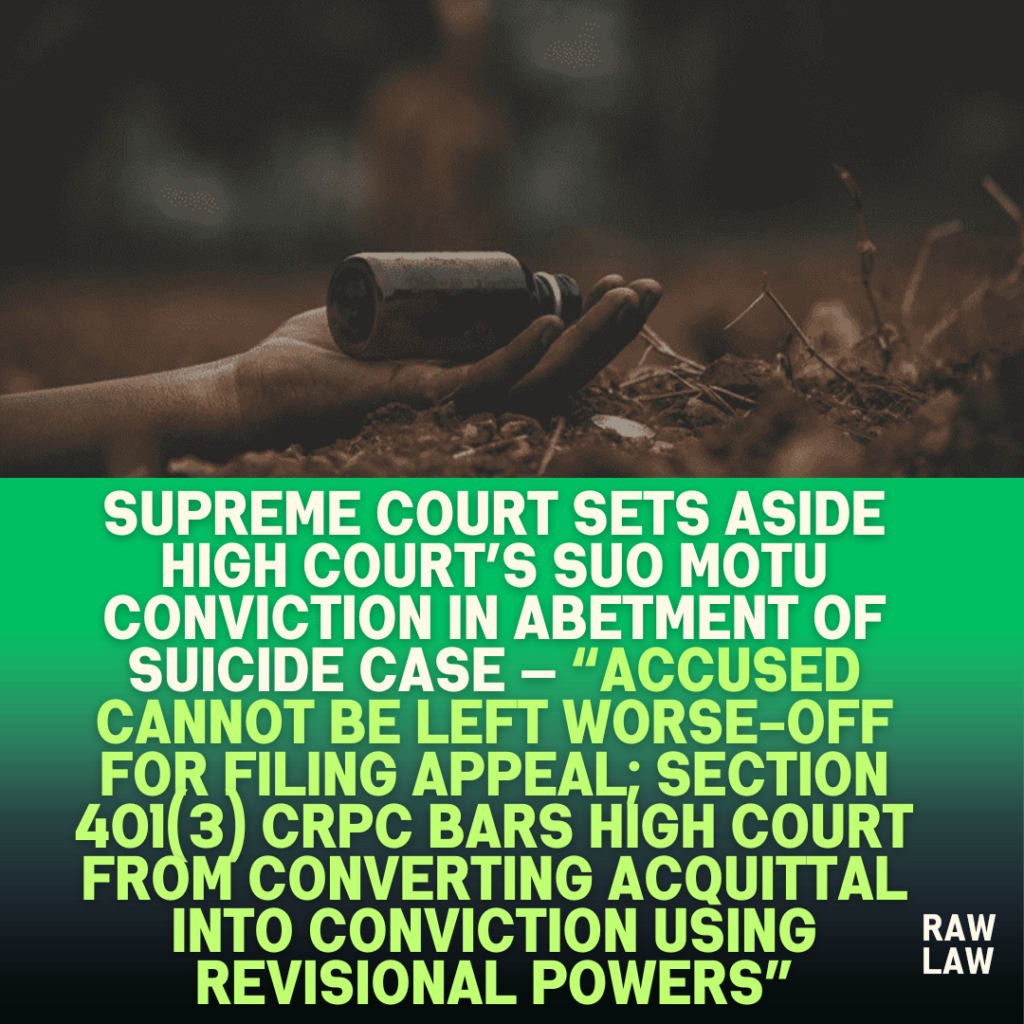Court’s Decision
The Supreme Court in Criminal Appeal Nos. 2892–2893 of 2025 allowed the appeal in part, setting aside the conviction and sentence under Section 306 IPC imposed by the Madras High Court through suo motu revision, in an appeal filed solely by the accused. The Court upheld the conviction and sentence under Sections 354 and 448 IPC as awarded by the Trial Court and affirmed by the High Court. It reiterated that a High Court, while exercising appellate jurisdiction in an appeal filed by an accused, cannot suo motu enhance the sentence or convict the accused under additional charges unless an appeal or revision has been filed by the State, victim, or complainant.
Facts
The appellant, neighbour to the deceased, allegedly entered her house at midnight on 11.07.2003 and attempted to outrage her modesty by hugging her. The deceased’s mother-in-law intervened, following which the appellant fled. The next morning, the deceased attempted to withdraw her daughter from school and subsequently went to a nearby field with her infant daughter, where she consumed oleander seeds and administered poison to the child, leading to both their deaths.
Based on a complaint by a village watchman, an FIR was registered under Section 306 IPC. A charge sheet was filed, and the case was committed to the Mahila Fast Track Court, which altered the charges to Sections 354 and 448 IPC and acquitted the accused under Section 306 IPC. He was convicted and sentenced under the other two sections.
Aggrieved, the appellant filed a criminal appeal. The High Court, while hearing the appeal, initiated suo motu revision proceedings against the acquittal under Section 306 IPC and ultimately convicted the appellant for abetment of suicide, enhancing the sentence to five years’ rigorous imprisonment. This conviction under Section 306 IPC was challenged in the Supreme Court.
Issues
- Whether the High Court could exercise suo motu revisional jurisdiction to convict the accused under Section 306 IPC in an appeal filed solely by the accused.
- Whether enhancement of sentence or addition of conviction in such circumstances violates the principle of fairness and procedural justice under criminal law.
Petitioner’s Arguments
The petitioner contended that:
- The High Court’s invocation of suo motu powers under Section 401 CrPC, to convict him under Section 306 IPC, in the absence of any appeal by the State or victim, was legally impermissible.
- Such action violated the principles enshrined under Section 386 CrPC, particularly the clause that prohibits enhancement of sentence in an appeal from conviction filed by the accused.
Respondent’s Arguments
The State supported the conviction, emphasizing that the act of outraging the deceased’s modesty and the subsequent suicide justified invocation of Section 306 IPC. It asserted that the High Court rightly exercised its powers under Section 401 CrPC to do complete justice.
Analysis of the Law
The Court undertook an in-depth interpretation of Sections 386 and 401 CrPC:
- Section 386(b)(iii) allows alteration in the nature or extent of sentence but not so as to enhance the same in an appeal from conviction filed by the accused.
- Section 401(3) bars the High Court from converting a finding of acquittal into one of conviction using revisional powers.
- The revisional power under Section 401(1) must be exercised with restraint, especially in the absence of an appeal from the State or complainant.
The Court strongly relied on its earlier decision in Sachin v. State of Maharashtra, Criminal Appeal Nos. 2073–2075 of 2025, where it ruled that appellate courts cannot enhance sentence or convict under additional charges in an appeal filed solely by the accused.
Precedent Analysis
- Sachin v. State of Maharashtra (2025) – The core precedent applied. Held that appellate courts cannot enhance sentence in appeals by the accused unless a separate appeal/revision is filed by the State/victim/complainant.
- Jyoti Plastic Works Pvt. Ltd. v. Union of India (2020) – Quoted for the doctrine of no reformatio in peius, which prohibits worsening a party’s position upon appeal.
These authorities underscored that fairness, procedural equity, and the constitutional right to appeal prevent a litigant from being left worse-off for challenging a decision.
Court’s Reasoning
The Court held:
- In the appeal filed by the accused, the High Court had no jurisdiction to convict under Section 306 IPC when the Trial Court had acquitted him under that charge.
- No appeal or revision had been filed by the State, victim, or complainant.
- The High Court’s use of suo motu revisional jurisdiction was unwarranted and contrary to the provisions of CrPC.
- The principle of no reformatio in peius was violated—“no appellant by filing an appeal can be worse-off than what he was.”
The Court concluded that enhancement of sentence or addition of new charges in an appeal by the accused alone is legally impermissible.
Conclusion
The Supreme Court allowed the appeal in part, setting aside the conviction under Section 306 IPC and restoring the Trial Court’s order. The conviction under Sections 354 and 448 IPC was affirmed. The appellant was directed to surrender if he had not served the complete sentence under these sections.
Implications
This judgment firmly reiterates the procedural boundaries for appellate and revisional jurisdiction. It safeguards the constitutional right to appeal and ensures that an accused is not prejudiced merely for availing this right. The decision reinforces the principle that judicial discretion in criminal appeals must be tethered strictly to the statutory framework and cannot be used to aggravate the position of the appellant-accused in the absence of a proper challenge by the prosecution.
